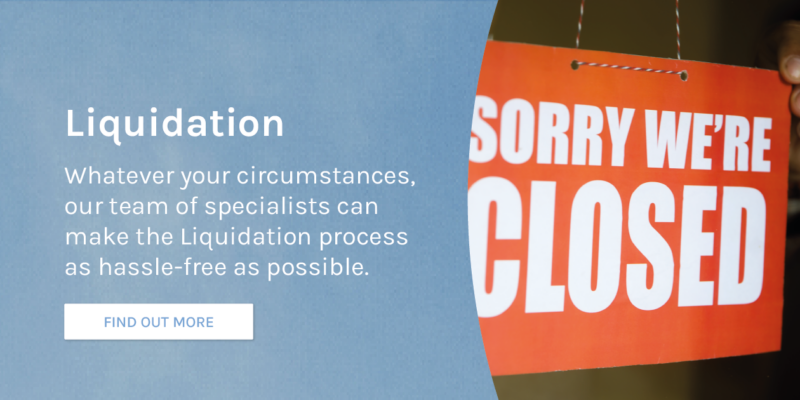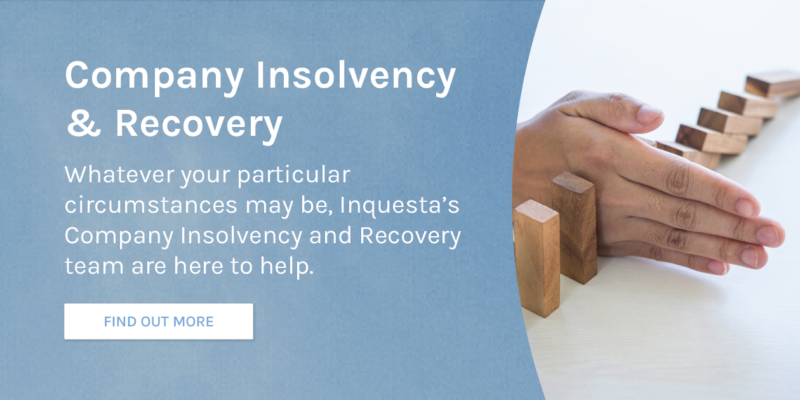When it comes to serious financial upheaval, where the need to resolve debt quickly and efficiently is key, it is crucial that you understand the important role each of the different types of creditors in insolvency have to play in the process.
Throughout the repayment process, each of the four types of creditors play distinct roles. The trickle down effect of repayment ensures that, the further down the priority list a creditor is, the less likely they are to receive everything they are owed.
So, whether you’re a business owner wading through the muddy waters of financial uncertainty, a shareholder questioning your return on investment, or an employee seeking to find out whether you will receive any money to lighten the burden should you be forcibly laid off, it’s important to do your own research.
The better you understand the possible implications of insolvency , which type of creditor you would be should the business become insolvent, and what this would mean to you, the better position you ultimately put yourself in should the worst happen.
What is a Creditor of a Company?
A creditor is an individual, business, or other entity that is owed money after providing a service/product, or has loaned money to another business. On a broad level, there are two primary types of creditor that you can expect to deal with: trade creditors and loan creditors.
The most common creditor of a company will be trade creditors. This includes banks and other financial institutions. These entities loan businesses money in order to finance their operations. This can be to help the company get started, expand to larger premises, or open an additional location.
A trade creditor is an entity that provides goods or services to a company. This can include goods that are then sold on, a product that is consequently used to produce another product, or a service that enables the firm to operate as normal.
Depending on your own business and how its model works, it is entirely possible that you could find yourself having creditors, as well as being one to another company.
What are the Different Types of Creditors in Insolvency?
When faced with insolvency, resolving your debts and distributing assets can be highly complex. Creditors play a vital role at this stage of the process. There are four different, more granular types of creditors in insolvency. These creditor types are secured creditors, unsecured creditors, priority creditors, and equity holders (shareholders). Each type has its own set of rights and priorities.
The details of each of the four different types of creditors in insolvency, as well as the order of the priority they hold, are as follows:
1: Secured Creditors
A secured creditor is a lender that holds a legally recognised claim on specific assets or collateral provided by a power as security for the initial loan or debt. This means that this type of creditor has a direct interest in certain assets, which acts as a safeguard should the borrower be unable to repay their initial loan/debt. This arrangement provides protection to the creditor should anything go wrong.
Of all of the different types of creditors in insolvency, secured creditors are almost always the very first to be paid what they are owed. In the event of a default, a secured creditor will be within their rights to take possession of any assets held up as collateral in order to sell it on to help recover their outstanding debt. This collateral could be anything from property and vehicles to machinery.
Being the highest priority ensures that secured creditors are more likely to recover their owed debts. However, this will depend on the specific situation.
2: Priority Creditors
Priority creditor status covers any creditors who are granted priority status in the repayment hierarchy due to legal provisions in place as well as the specific nature of the claims. This creditor is generally placed high up in the pecking order should the debtor find itself in financial distress.
Some common examples of priority creditors include:
- Employee Wage Claims: One of the most common types of priority creditors is an employee who is owed wages, salary, benefits, etc. when their employer becomes insolvent. These workers will have a high priority of repayment to ensure that they receive what they are owed.
- Administrative Expenses: Some expenses will be incurred during the insolvency process itself. This includes bankruptcy administrators, legal fees, and other administrative costs. These costs are placed higher up in the process because they are often essential to ensure the insolvency process can continue as necessary.
- Owed Taxes: Any debt owed to an official government tax authority will be prioritised to ensure that as much money can be repaid as possible. This includes corporation tax, sales, and more.
When the assets of the insolvent business are being liquidated/distributed, and the secured creditors have received what they are owed, the priority creditors’ claims will generally be resolved next.
3: Unsecured Creditors
Unsecured creditors are individuals or entities that have lent another party money without any specific assets or collateral being pledged as part of the deal. Where secured creditors have a direct claim on specific assets, an unsecured creditor will rely solely on the debtors’ word to repay the debt as per the terms of their agreement.
Common examples of unsecured creditors include:
- Suppliers
- Vendors
- Service Providers
- Lenders (who have extended credit without collateral)
In insolvency, unsecured creditors will generally have a lower priority than both secured and priority creditors, but a higher priority than the equity holders. Whenever assets are liquidated to satisfy outstanding debts, the unsecured creditors will generally be paid second. However, their recovery will depend on the available assets left after secured creditors have had their share, as well as the specifics of their claim.
As a result, if a company is struggling financially and has entered into insolvency proceedings, once the secured creditors have taken what is owed to them, unsecured creditors can sometimes receive only a minor portion of what they are owed. In some situations they may even receive nothing at all. 
4: Equity Holders (Shareholders)
Enquiry holders, or shareholders, are individuals/entities that hold direct ownership interest in the insolvent business. This interest will generally come by way of owning shares. The position of an equity holder will generally hold significant financial risk as their ultimate financial return will depend almost entirely on the performance of the company they own a stake in.
The positive side of being an equity holder is that, when the company is succeeding, they will often receive dividends/capital gains. However, if it enters into financial difficulties, they may instead face potential losses.
Compared to the other types of creditors in insolvency, equity holders are typically the lowest priority when it comes to repayment. Since secured, priority, and unsecured creditors will all be higher priority of repayment, equity holders have little to no chance of recovering their investment.
Peace of Mind With Insolvency Support You Can Trust
In the often complex, ever-evolving landscape of financial turmoil, one thing is clear: having an expert in your corner can be the difference between chaos and clarity. Once you have an understanding of the four types of creditors in insolvency, it should become clear that navigating the insolvency process alone can be treacherous.
Any mistakes could put you in a difficult position, and will often leave you out of pocket. This means you will likely need to understand more than just the different types of creditors in insolvency and the repayment hierarchy. An experienced insolvency processional can help guide you towards the best resolution for you.
The Inquesta team of seasoned specialists are well-versed in the nuances of financial distress and insolvency. We bring a wealth of knowledge and experience to the table, to ensure that the process goes as smoothly and stress-free as possible.
Our insolvency experts have the necessary acumen to devise comprehensive strategies that will not only mitigate financial crises, but guide the process to an amicable resolution that can benefit as many people as possible.
In times of great uncertainty and stress, having the reassuring presence of an insolvency expert behind you can help to turn the insurmountable into a path towards a brighter future. For more information about what Inquesta’s team of insolvency professionals can do for you, get in touch today.




